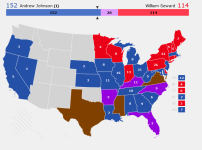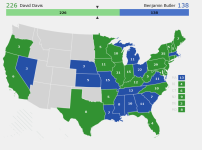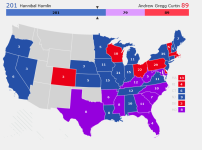The Fruit-tree and the Avalanche
Presidents of the Confederated States of America
1857-1863:
John A. Quitman (Independent/Democratic)
US Presidential Election, 1856: John C. Fremont (Republican) def. Franklin Pierce (Democratic), Robert Stockton (American)
def 1857: (with Sterling Price) unopposed
defeated in civil war, 1857-1859: John C. Fremont (Republican | United States of America)
1863-1869:
Judah Benjamin ("Administration" Democratic)
def 1862: (with Jefferson Davis) Joe E. Brown ("State's Rights" Democratic), Sterling Price ("Priceite" Democratic)
1869-1872:
Robert Rhett (State's Rights Democratic)
def 1868: (with Henry Foote) Josiah Gorgas ("Administration" Democratic)
deposed 1872 by Forrest's Mutiny
1872-1875:
Nathan Bedford Forrest (Emergency Military Administration)
killed 1875, as part of the Battle of Robinson Springs
1875-1877:
Benjamin McCulloch (Emergency Military Administration)
defeated by in war, 1871-1877: Ulysses S. Grant (Republican | United States of America), Juan Prim (Progresista | Spain)
1877-1880:
Benjamin McCulloch (Independent)
died 1880, of malarial fever
1880-1880:
William Crittenden ("War" Independent)
officially deposed, 1880, under 7th Amendment to the Confederated States Constitution
1880-1898:
William Walker (Independent)
def 1884: (with Robert Toombs) unopposed
def 1885: (with William H. Norris) no election held
def 1893: (with George Washington Gordon) no election held
assassinated 1898 by Victor Delgado on the orders of Gen. Anastasio Ortiz
1898-1901:
George Washington Gordon (Military Government)
def 1898: (with Ashbury Harpending) no election held
killed 1901 during Fall of New Memphis; Confederated States of America officially dissolved in favour of the Republic of Nicaragua
Capitals of the Confederated States of America
1857-1865: Jackson, Mississippi
1865-1866: Atlanta, Georgia [declared Confederate Capitol District but unrecognised by state government of Georgia]
1866-1874: Jackson, Mississippi
1874-1876: Jackson, Mississippi (de jure), St Augustine, Florida (de facto)
1876-1877: Jackson, Mississippi (de jure), Constitution City, Puerto Rico (de facto)
1877-1900: Granada, Nicaragua
1900-1901: New Memphis, Nicaragua
The Confederated States died slowly, but they got better at dying as they got practice at it. If you want proof, just look at how their presidents died.
Let's start, well, at the start--Quitman. Like most of the Confeds' prominent patriots, he was born outside the country--a New Yorker who moved down South to more fully enjoy the economic benefits of owning people, and, thanks to spending his time pillaging Mexico City rather than managing his plantations, really believed the Southern way of life worked. His firey championship of slave power made him well-known, but his support--military and political--of the Lopez expedition to steal Puerto Rico from Spain made him a legend to every filibustering slaveowner out there. After Pierce was sent packing by 500 votes in (what was then called) North California, and the presidency was in the hands of a radical pro-treating-human-beings-as-human-beings extremist who was threatening to veto the illegal annexation of an entire seperate country, he was the obvious choice to lead the South to ""freedom"".
The problem, of course, was whether the South would let itself be led. For all Quitman's nous, the nation he was ruling was practically a feudal state, with powerful landowners jealously guarding their fiefdoms from possible infringment. Managing that pack of little cliques is probably why Quitman, well, quit, after just one term, but it didn't save him in the end. With one party denouncing him as a tyrant no better than Fremont himself, and the other, split between his embittered Secretary of State and his narcissistic Vice President, clamouring and badgering for his support, something had to give--and what gave was Quitman's ticker. On February 8th, 1863, the father of the Confederated States, the fire-breather's fire-breather, the man who crowned King Cotton, passed out on his front porch in a puddle of his own piss.
By the time his successor's term was over, he might have envied Quitman's position. Judah P. Benjamin had narrowly clinched the election on his record of being the most competent Confederated cabinet minister--an award that's up there with "tallest dwarf" and "most polite Philadelphian"--but quickly found his ambitious plans sinking in the dough-filled tub of Southron society. An attempt to create a formal military structure instead of twenty jumped-up militias in a trenchcoat? Blocked by Congress. An attempt to move the capitol to a new and well-connected city that couldn't be held hostage by a random state government? Blocked by a
different random state government. Attempts, again and again, to bootstrap an industrial economy that could make more than flour and cloth? Blocked--and given the way existing slave populations factored into this plan, we can all be thankful he didn't succeed there.
In his goals in domestic policy, Benjamin failed, and in his one goal in foreign policy--preventing a Spanish-American treaty--he failed. The only area in which Benjamin improved upon from his predecessor was retirement. While he might never have achieved any measure of popularity, for reasons that can depressingly be boiled down to his religion, he was still a major player in New Orleans' high society, and was able to profitably practice law there for the few years his nation had left. Before the city fell to the Union, he managed to secure a place on a Confederated navy clipper to Puerto Rico, and swiftly fled from there to Brazil, where he spent a comfortable retirement working on an autobiography that may as well have been subtitled
I Told You So. Of course, we're getting a little ahead of ourselves here--so let's move onto his successor, who again improved. You see, other leaders of the Confederation had died alone. Rhett at least managed to drag the rest of his country with him.
Despite six years of best efforts to the contrary, the planter aristocracy were finally in the national driving seat, and Rhett was ready to grab hold of that red-hot oven hob once more and see if this time the delectable glow wasn't accompanied by pain. Sure, every single factor that had led to Confederated victory last time--a genuinely unpopular and unprepared President of the Union, Californio resistance in the west tying up troops, a friendly Mayor of New York willing to block most of that state's contributions to the war effort--was gone. Sure, British economic support had evaporated once India became a pliant source of cotton, and French diplomatic support had been lost thanks to pointless sabre-rattling towards their puppet emperor in Mexico. Sure, the Spanish navy had heavily prepared for the next round of filibusters and the new Grand Army of the Republic was spoiling for a rematch, while the Confederated military couldn't root out jayhawkers in the world's flattest state. But surely Southern pride and divine providence would see the Golden Circle in Southron hands!
Within six months of the declaration of war, General Shaw was leisurely advancing down the Mississippi and arming slaves as he went, Cuban troops had thoroughly crushed the landings in Matanzas and were starting to look speculatively over the straits, and Governor Mosby had officially signed his state, and most of his country's industry, back into the Union. Rhett continued to insist that everything was going well, the state militia system was fine, and that the intervention of the other European powers would see them in Philadelphia by July 4th. By the time reports filtered back to Jackson about a minor scuffle between the Texan and South Carolinan armies that had left 50 men dead without a single Union gun being fired, what passed for the military high command had had enough.
On February 6th, 1872, the general of the Army of Tennessee, and most of his subordinates, arrived at the Capitol to discuss matters with the President. Tragically, an "Union sniper", who had somehow snuck past every single Confederated soldier, managed to assassinate the President
and Vice-President while they were being "escorted" to a "secure location", leaving said general "no choice" but to "temporarily assume command". There was a brief period where this sort of worked. For all his many, many, monstrous atrocities, Forrest was a decent enough military commander, and more importantly, had enough pull among the various petty Southron generals that he could metaphorically go to Bengal and end the anarchy of the state militias. Indeed, Forrest was so successful he even became the first Confederated president to die in a manner he 100% would have approved of--in the middle of a cavalry charge. He probably would have preferred being cut down by a fellow rider over, say, a barrage of cannonfire courtesy of the 14th Rhode Island Heavy Artillery USCT, but it's the thought that counts.
(The only pitched battle where both leaders were elected or supposed-to-be-elected heads of state, by the way! Look it up. Really.)
As the tiny particles of his predecessor in office drifted on the autumn breeze, McCulloch hastily elbowed his way into command by virtue of no-one else wanting to either be in charge or not do any pointless suicide attacks. In some ways, he was, again, the right man for the situation. He'd led rangers across the New Mexican deserts to Texas as the Benicia Arsenal fell, and harried the forces after him all the way. Now, he'd be leading the forlorn and bloody retreat of a whole nation. Down to St Augustine as the cities along the Coosa fell, dodging Union troops and freed slaves out for blood. Down through the Carribbean as the American fronts linked up, dodging Spanish gunboats and summer storms. Down to Nicaragua, the colonial territory carved out at the very start of the conflict, as marines stormed the beaches of what became the city of Ponce once again. Down, eventually, to a "ceasefire" that was a capitulation in all but name. Down to fever, crapping blood, and a joke of a state funeral, the last real president of a bloodstained nation never old enough to drink.
McCulloch had never sworn in a vice president, on the basis that he was working out of a fucking tent and couldn't spare the time. As such, the chain of succession became unfortunately unclear. General William Crittenden, a veteran of the Puerto Rican expedition you might remember I mentioned earlier, claimed the Presidency on the basis of being the closest thing to McCulloch's second-in-command during his period running things from Ponce. Senator Robert Toombs, one of the last links to the generation that won independence, claimed the Presidency on the basis of being the rightful Speaker. Governor William Walker, who'd been ruling Nicaragua uncontested for the past thirty years, claimed the Presidency on the basis of having all the guns. In the end, Crittenden's proposal that they should keep fighting a hopeless war from Central America proved the most persuasive case against him, and unlike what happened with Rhett, Walker didn't even bother to pretend someone else shot him.
An experienced and highly popular leader even before he took office, there's an argument that Walker was the Confederation's most successful president. He presided over a period of relative peace and even more relative prosperity (bar a few assassins thrown away at the military governor of Puerto Rico). He united what was left of the nation, with Rhett's faction co-opted and smothered in the crib. He didn't cause any major national problems that didn't exist already. All he did was sit in his plantation, maintaining his dying country's life support as long as he could, without seeking to prevent the inevitable. Even his death went like that. Delgado's pistol was cheap and low-calibre, and his shots sank fruitlessly into El Jefe's chest. The bullets still made their way to his heart a few hours later, regardless.
The Nicaraguan rebel movements saw their chance, and took it, and the Confederation finally learnt a lesson it should have learnt half a century ago, in Sonora and California and Kansas--if the vast majority of the population of a country is on one side, and you're on the other one, no amount of leadership or technology or whiteness helps. The Confederation lost the countryside, as the workers on the vast estates pulled their masters from their beds and waved their heads from balconies, and quickly they began to lose the cities, where every face slightly darker than a light tan could be lighting fires or passing messages to the Amerrisque. At the dawn of a new century, the Confederated government set out on the last of its many, many, pathetic retreats, north to the majority-Southron city of New Memphis, in the shade--in case the situation needed some massive honking symbolism--of the San Cristobal volcano. From there, President Gordon, an infantry leader and military policeman of no great skill or ability, watched it all crumble.
The last official act of the Confederated States was a proclamation that New Memphis would be defended to the last, "and the property within denied to rebel forces". The handful of house slaves in the city, knowing exactly what this meant, helped General Ortiz' forces over the walls themselves. (Yeah, probably a legend, but I'm a storyteller, not a historian. Well--you know what I mean!). Gordon himself is on record as having picked off an attacker or two with his rifle, but this small measure of personal valour didn't save him from capture, from trial, or for execution.
There is at least one consolation Gordon could have taken. Facing a firing squad with an upright back and no blindfold, getting off one last riposte about "the civilisation of the white race", even spitting his cigarette towards his attackers--out of all the Confederated leaders (and in contrast to how poorly he used his life), he was the best at dying.




